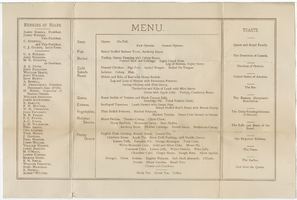Search the Special Collections and Archives Portal
Search Results
The Production Company Audiovisual Collection
Identifier
Abstract
The Production Company Audiovisual Collection consists of commercials, advertising, and political campaigns from approximately 1965 to 1995 created by The Production Company, a television production company founded by Thomas “Bob” Patrick in Las Vegas, Nevada. The collection consists of primarily 16 mm film and video formats such as VHS, U-Matic, Betacam, open reel, Type C, and quadruplex. The videotapes and films in this collection represent advertising and marketing for hotels and casinos, entertainment companies, politicians, and local businesses located in Las Vegas, Nevada.
Archival Collection
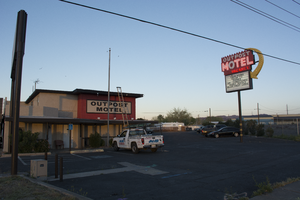
Photographs of Outpost Motel, Las Vegas (Nev.), March 14, 2017
Date
Archival Collection
Description
Site name: Outpost Motel (Las Vegas, Nev.)
Site address: 1104 N Boulder Hwy
Sign owner: Vegas Outpost Motel LLC
Sign details: The Outpost motel was built all the way back in 1937 and still resides out in Henderson along Boulder Highway. The current sign was installed around the 1950's.
Sign condition: 5, the sign is in excellent condition.
Sign form: Pole
Sign-specific description: This pole sign has a zig-zag like design on the top of it. Underneath that is the word "OUTPOST" in bold white letters against a forest green background. "MOTEL" is painted under that in bold white letters as well. "VACANCY" is painted under the "OTEL." Outlined in neon is "NO," which is difficult to see if it's not lit up. Each of these words is outlined with neon as well so you can see them at night when the sign would be lit up. The lower half of the sign is a back lit reader board. On the outer edge of the sign is a large, yellow arrow that extends from the top of the sign above the "O" in "OUTPOST" and points to the reader board. This is also covered in incandescent light bulbs.
Sign - type of display: Neon, incandescent, backlit reader board
Sign - media: Steel and plastic
Sign - non-neon treatments: Reader board
Sign animation: From photos, it looks as though the sign has some sort of animation to it in the yellow arrow on the outer edge. The incandescent light bulbs look as though they twinkled, but it is difficult to tell exactly how or in what direction.
Sign environment: This property sits way out in Henderson along Boulder Highway. It is down the street from Sam Boyd Stadium, Clark County Wetlands Park, and the Henderson Bird viewing Preserve. The properties that sit immediately next to the motel are a few small casinos and a random assortment of businesses.
Sign - date of installation: Possibly the 1950's
Sign - date of redesign/move: Photos from 2014 show that the sign was in a rough condition at one point, but in 2015 it received a fresh coat of paint.
Sign - thematic influences: The design for this sign is similar to many of the small motel throughout the city from the 1950's/60's era. They usually have one major element that makes them striking when viewed from the street view, for this sign it would be the big, yellow arrow. It is also a pole sign and many of the motels from this time period use this style of sign.
Survey - research locations: Roadside architecture http://www.roadarch.com/signs/nv2.html , Classic Las Vegas website ghhhttp://classiclasvegas.squarespace.com/classic-las-vegas-photo-galler/classic-las-vegas-signs/900788 , Asessor's Page http://www.clarkcountynv.gov/assessor/Pages/searchbybusinessname.aspx , Flickr website for photos https://www.flickr.com/photos/roadsidepictures/294981090
Survey - research notes: There are not many sources discussing the history of this property.
Surveyor: Lauren Vaccaro
Survey - date completed: 2017-08-28
Sign keywords: Neon; Incandescent; Backlit; Steel; Plastic; Reader board; Pole sign; Directional
Mixed Content
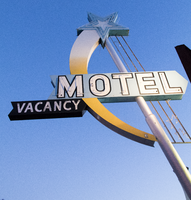
Photographs of Star Motel sign, Las Vegas (Nev.), March 3, 2017
Date
Archival Collection
Description
Site address: 1418 S 3rd St
Sign owner: M V Star Group LLC
Sign details: 0.33 acre lot, originally constructed in 1947.
Sign condition: 4 - The sign is in excellent condition, but it does not light up at night.
Sign form: Pole sign
Sign-specific description: The sign itself is attached to a silver pole that extends out toward 3 rd St and is planted into the ground. On the top of the pole is a bright, blue star with a smaller white star in the center. The neon tubes attached to the sign are in concentric star shapes radiating out from the center. Extending out from the star to 3 rd st and curving back towards the pole that hold the sign is a trail implying that this is a shooting star. The first third of this trail is white and then the paint changes to yellow and remains yellow for the rest of the trail. The entire trail of the star is covered with yellow incandescent light bulbs. There are three very thin steel poles on the opposite side of the star from where the trail is attached. These smaller poles run parallel to the main pole of the sign and end about the same place where the tail of the star ends at the other side of the pole. Attached to these thin poles are stars ranging in size and made out of neon tubes. About at the midpoint of the main pole supporting the sign is a minimal, bright blue arrow that has "MOTEL" painted on it in bold white letters with a black outline. Neon tubes in the shape of each letter are attached to the center of the letters. Attached to the bottom of the tail end of this arrow is a smaller, minimal, black arrow that has "VACANCY" painted on it in bold white letters. Neon tubes in the shape of these letters fill this sign as well.
Sign - type of display: Neon and Incandescent
Sign - media: Steel
Sign animation: Unknown, as it no longer lights. However according to RoadArch.com, at one time it might have flashed.
Sign environment: The property is in the heart of the Arts District. It resides next to many other small motels in this neighborhood. It is only a few blocks away from Main Street and Charleston where there are many art galleries, restaurants, and vintage boutiques.
Sign - date of installation: c. 1950s
Sign - date of redesign/move: Based on earlier photographs from the 1950's, the sign's main star that is blue with a smaller white star in the center was originally all white. Also, the white and yellow trail it leaves behind was initially all yellow as well. It is also believed that there were more stars attached to the metal bars that extend from the blue and white star and that they would have flashed.
Sign - thematic influences: A popular theme for properties during this time was the Space Age and this is sign is an example of that influential theme.
Sign - artistic significance: This sign shows an influence of the Space Age that was going on during the late 50's. Many motel signs in the city evoked the theme for the property and this sign does so for the Star Motel.
Survey - research locations: Assessor's website, Vintage Vegas, www.roadarch.com
Surveyor: Lauren Vaccaro
Survey - date completed: 2017-08-21
Sign keywords: Neon; Incandescent; Steel; Pole sign
Mixed Content

Photographs of The Palm Piazza sign, Las Vegas (Nev.), April 18, 2017
Date
Archival Collection
Description
Site address: 1919 Fremont St
Sign owner: Zen Real Estate Holding
Sign details: This building dates back to 1936 and was made for commercial living accommodations/ deluxe motel. Previous to the Palm Piazza opening this location was called the Ariza Motel which was abandoned for a few years. Kamran Foulad in 2013 purchased this building to renovate it in an effort to revitalize downtown. The Palm Piazza opened as an apartment complex in late 2013.
Sign condition: 4- slight fading but still in good condition
Sign form: Pylon
Sign-specific description: There is a black base of the sign that is not very tall which holds a back lit plastic sign that has an image of a lady under a palm-tree leaf canopy and the location's phone number in black numbers. Above this is a blue steel backing that in the shape of a sideways trapezoid which is about half of the width of the black sign beneath it (and is laid on the building side of the sign). This portion has black back lit plastic letters that spell out "The Palm Piazza" in a bubbly cursive font towards the top of the sign. Then below this in yellow skeletal neon tubes they have "Luxury Living" spelled out in a thin tight cursive font. On the road side of the sign there is an arrow blue steel arrow that points down towards the black portion of the sign. The arrow is outlined in yellow neon tubes and has "Enjoy Las Vegas" in clear print font skeletal neon tubes.
Sign - type of display: Neon and back lit plastic signs
Sign - media: Steel and plastic
Sign - non-neon treatments: Plastic portion of the sign
Sign environment: This area is located East Fremont close to Bruce Street. There are other motels surrounding this area.
Sign - date of installation: This sign has been up in form that we see today in 2013, though it looks as though they re-purposed/redesigned the sign that the Ariza Motel (previous property name) had. The previous sign has been up since at least 2007.
Sign - date of redesign/move: 2013- Ariza Motel blade taken down and the rest of the sign redesigned for the Palm Piazza.
Sign - thematic influences: Previous to the apartment complex it was a motel and their signs still has remnants of that 1950/60's motel sign design particularly with the arrow.
Survey - research locations: Assessor's Page, Review Journal article discussing the renovation of the building https://www.reviewjournal.com/local/local-las-vegas/developer-eyeing-overlooked-las-vegas-downtown-area-gets-city-boost/, Google map sattelite/ roadside view
Survey - research notes: On the top portion of the blue steel sign there are 3 short black steel beams coming out of it which used to hold an old MOTEL blade sign which was taken down around 2013.
Surveyor: Emily Fellmer
Survey - date completed: 2017-09-09
Sign keywords: Neon; Backlit; Plastic; Steel; Pole sign
Mixed Content

Fernando Rocha oral history interview: transcript
Date
Archival Collection
Description
Oral history interview with Fernando Rocha conducted by Nathalie Martinez and Barbara Tabach on November 13, 2019 for the Latinx Voices of Southern Nevada Oral History Project. In this interview, Fernando Rocha recalls growing up in Santa Ana, California and in Sunrise Manor in Las Vegas, Nevada. Fernando Rocha is a Mexican professional who is committed to giving back to the Latinx youth of Las Vegas. He talks about his responsibility as a translator in his family with his siblings. He credits his academic and professional success to the Clark County School District and programs such as GEAR UP and Upward Bound. After studying at Hofstra University, he came back to Las Vegas to work with Wells Fargo and is an active community member as co-founder of the Nevada Youth Coalition and work through the Association of Latino Professionals for America (ALPFA) and Nevada Promise Mentor at the College of Southern Nevada (CSN).
Text
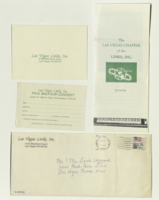
Mabel Hoggard: personal correspondence
Date
Archival Collection
Description
Folder of materials from the Mabel Hoggard Papers (MS-00565) -- Personal papers file. This folders contains correspondence from friends, family members, and various organizations. It also includes an agenda for "National Sorority of Phi Delta Kappa" from Sunday October 28, 1973.
Text

Marvelys Lopez Omaña oral history interview: transcript
Date
Archival Collection
Description
Oral history interview with Marvelys Lopez Omaña conducted by Monserrath Hernandez and Barbara Tabach on February 21, 2020 for the Latinx Voices of Southern Nevada Oral History Project. In this interview, Marvelys Lopez discusses her childhood and growing up in Caracas, Venezuela, where her father owned a toy store. She attended an all-girls Catholic School and from a young age knew that she wanted to be a doctor. In 1993, at the age of seventeen, she was able to study abroad in the United States for one year and moved to Las Vegas, Nevada. She returned to Venezuela to attend medical school and while attending medical school she met her husband, who was studying to be a registered nurse at the time. Lopez Omaña recalls volunteering as a firefighter in Venezuela, and discusses the political change that happened in Venezuela during her last years in medical school. She moved to back Las Vegas with her husband in 2003 and began working as a caregiver. She recounts Her first son's birth story, and describes how she became a Certified Professional Midwife.
Text

Transcript of interview with Arby Hambric by Claytee D. White, September 23, 2015
Date
Archival Collection
Description
Arby L. Hambric's book entitled, "To Thee I See: From picking in the fields of Texas to cooking for dignitaries on U.S. Navy ships, a journey I wouldn't change," describes his profound journey from working in the cotton fields as a child to being drafted into the U.S. Navy, before completing high school. During this interview, he recalls the significant achievements of the "Red Tails" and the Tuskegee Airmen. Beginning his 20 year Navy career before military integration, Arby describes the racial tensions that plagued the U.S. Navy in the 1940s, and discusses how he was able to successfully navigate that racist environment for two decades and three war eras. Arby enrolled in San Diego State College after leaving the U.S. Navy. He also worked as maintenance personnel for Sears and Roebuck and started a catering business with his wife. He became a member of the Southern Nevada Enterprise Community, SNEC Board upon moving to Las Vegas, Nevada, after his wife died. With a family legacy he can be proud of, Arby highlights the achievements of his great grandson Taquan Mizzell, a Virginia Cavaliers running back at the University of Virginia. As a Navy veteran, Arby often volunteered his time and resources to help others in need. He recalls driving the sick and elderly back and forth from the Westside community to Valley Hospital or University Medical Center, UMC. He also discusses government enforced road closures and a wall that was built to block Blacks from entering the new downtown. This interview sheds new light on military integration and offers key strategies for overcoming environmental racism. Arby mentions a documentary about the closing of the wall and offers his predictions on the future of the Westside.
Text
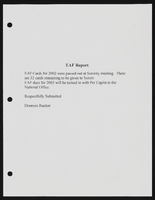
Alpha Kappa Alpha Sorority, Theta Theta Omega Chapter EAF committee reports
Date
Archival Collection
Description
From the Alpha Kappa Alpha Sorority, Incorporated, Theta Theta Omega Chapter Records (MS-01014) -- Chapter records file.
Text

